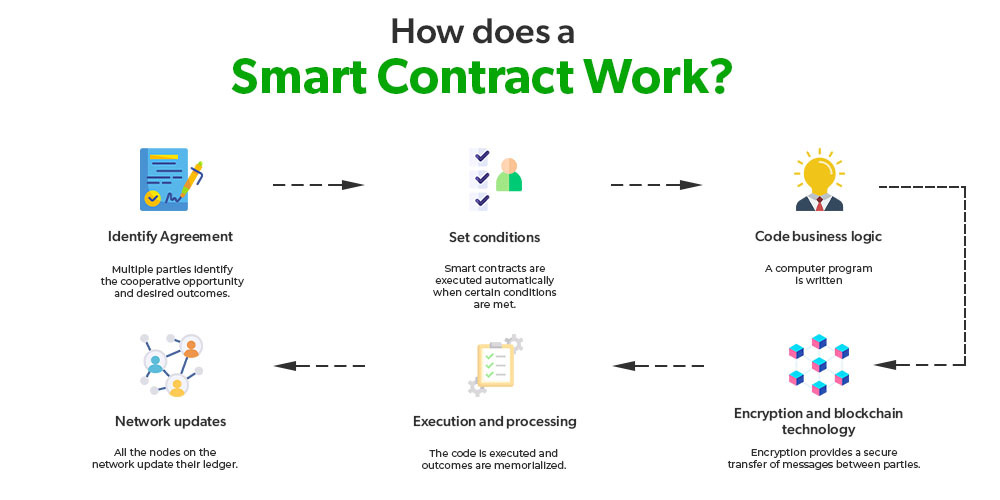¶ Blockchain Development
Blockchain development is the process of creating decentralized applications and smart contracts using blockchain technologies. It involves understanding distributed systems, cryptography, and specialized programming languages.
Before diving into the technical details, let's understand some key blockchain-related terms:
- Ethereum: A decentralized, open-source blockchain platform that enables smart contract functionality.
- Gas: The fee required to execute transactions or smart contracts on the Ethereum network.
- Wallet: A digital tool that stores cryptocurrency and interacts with blockchain networks.
- DApp (Decentralized Application): An application built on a decentralized network.
- ERC-20: A standard for fungible tokens on the Ethereum blockchain.
- Metamask: A popular cryptocurrency wallet and gateway to blockchain applications.
¶ Key Components of Blockchain Development
Popular Blockchain Platforms
Ethereum, Binance Smart Chain, Polkadot, & Solana.
Popular Development Tools
Truffle Suite, Remix IDE, Hardhat, Ganache, & Web3.js
¶ What is Solidity ?
Solidity is a statically-typed, contract-oriented programming language designed for implementing smart contracts on blockchain platforms, primarily Ethereum.
Key Concepts
-
Contract Declaration
- Similar to classes in object-oriented programming
- Defines the structure and behavior of smart contracts
-
Data Types
uint: Unsigned integerint: Signed integeraddress: Ethereum addressbool: Booleanstring: Stringbytes: Byte array
-
Visibility Modifiers
public: Accessible internally and externallyprivate: Accessible only within the contractinternal: Accessible within the contract and derived contractsexternal: Accessible only externally
Example Solidity Syntax
// SPDX-License-Identifier: MIT
pragma solidity ^0.8.0;
contract SimpleStorage {
// State variable
uint256 favoriteNumber;
// Struct definition
struct Person {
uint256 favoriteNumber;
string name;
}
// Function to store a number
function store(uint256 _favoriteNumber) public {
favoriteNumber = _favoriteNumber;
}
// Function to retrieve the stored number
function retrieve() public view returns (uint256) {
return favoriteNumber;
}
}
More Resources to Learn Solidity
With Solidity, you can create contracts for uses such as voting, crowdfunding, blind auctions, and multi-signature wallets.
¶ What is Truffle ?
Truffle is a comprehensive development environment, testing framework, and asset pipeline for Ethereum.
Truffle Setup
Truffle Project Setup
# Install Truffle globally
npm install -g truffle
# Create a new Truffle project
mkdir blockchain
cd blockchain
truffle init
Truffle Project Structure
blockchain/
│
├── contracts/ # Solidity smart contracts
├── migrations/ # Deployment scripts
├── truffle-config.js # Configuration file
└── package.json
Truffle Commands
truffle compile: Compile smart contractstruffle migrate: Deploy contracts to a blockchain networktruffle test: Run test scriptstruffle console: Interactive console for contract interaction
Truffle Suite is the most comprehensive suite of tools for smart contract development with Smart Contract Lifecycle Management & Automated Contract Testing with Many Plugins & Tools like Ganache.
¶ What is Ganache ?
Ganache is a personal blockchain for Ethereum distributed application development. Ganache is a easier and faster way to develop, deploy, and test dApps.
In simple words we are creating a fake etherium network in our computer to emulate the smart contracts in test environment.
CLI Installation
Prerequisites
- Node.js (version 12.13.0 or later)
- npm (Node Package Manager)
Installation Steps
# Install Ganache globally
npm install -g ganache
# Verify installation
ganache --version
Using Ganache via CLI
# Start Ganache with default settings
ganache
# Specify a specific port
ganache -p 8545
Desktop Application Installation
Windows
- Visit the official Ganache website: https://www.trufflesuite.com/ganache
- Download the Windows installer
- Run the
.exefile - Follow the installation wizard
- Launch Ganache from the Start menu or desktop shortcut
macOS
- Visit the official Ganache website: https://www.trufflesuite.com/ganache
- Download the macOS
.dmgfile - Open the
.dmgfile - Drag the Ganache application to your Applications folder
- Launch Ganache from Applications or Launchpad
Linux
- Download the appropriate
.AppImageor.debfile from the Ganache website - For
.debfile:# Install using dpkg sudo dpkg -i ganache-*.deb # If missing dependencies, run sudo apt-get install -f - For
.AppImage:# Make the AppImage executable chmod +x Ganache-*.AppImage # Run the application ./Ganache-*.AppImage
¶ Smart Contracts
A smart contract is a digital program that automatically executes and enforces contract terms between parties. It directly controls the transfer of digital assets based on predefined conditions, operating without intermediaries. Unlike traditional contracts, smart contracts self-execute exactly as programmed, ensuring precise, transparent, and tamper-resistant agreement fulfillment through computer code.
¶ Key Features
¶ 1. Minter Functionality
- Only the contract creator can mint new tokens
- Minter's address is set during contract creation
¶ 2. Token Balance Tracking
- Uses a mapping to store token balances for each address
- Public variables allow external visibility
¶ 3. Token Transfer
- Allows sending tokens between addresses
- Checks sender's balance before transfer
- Logs transfer events for tracking

¶ How to Write a Smart Contract ??
¶ Contract Overview
A basic cryptocurrency smart contract that allows:
- Token creation by the contract creator
- Transferring tokens between addresses
- Tracking token balances
¶ Solidity Code Explanation
pragma solidity ^0.4.21;
contract yourToken {
// Contract variables
address public minter;
mapping (address => uint) public balances;
// Event to log token transfers
event Sent(address from, address to, uint amount);
// Constructor sets the contract creator as the minter
function yourToken() public {
minter = msg.sender;
}
// Function to create new tokens
function mint(address receiver, uint amount) public {
if(msg.sender != minter) return;
balances[receiver] += amount;
}
// Function to send tokens between addresses
function send(address receiver, uint amount) public {
if(balances[msg.sender] < amount) return;
balances[msg.sender] -= amount;
balances[receiver] += amount;
emit Sent(msg.sender, receiver, amount);
}
}
We will learn how to use Solidity, Truffle Suite, Ganache to make a blockchain app in the next section.